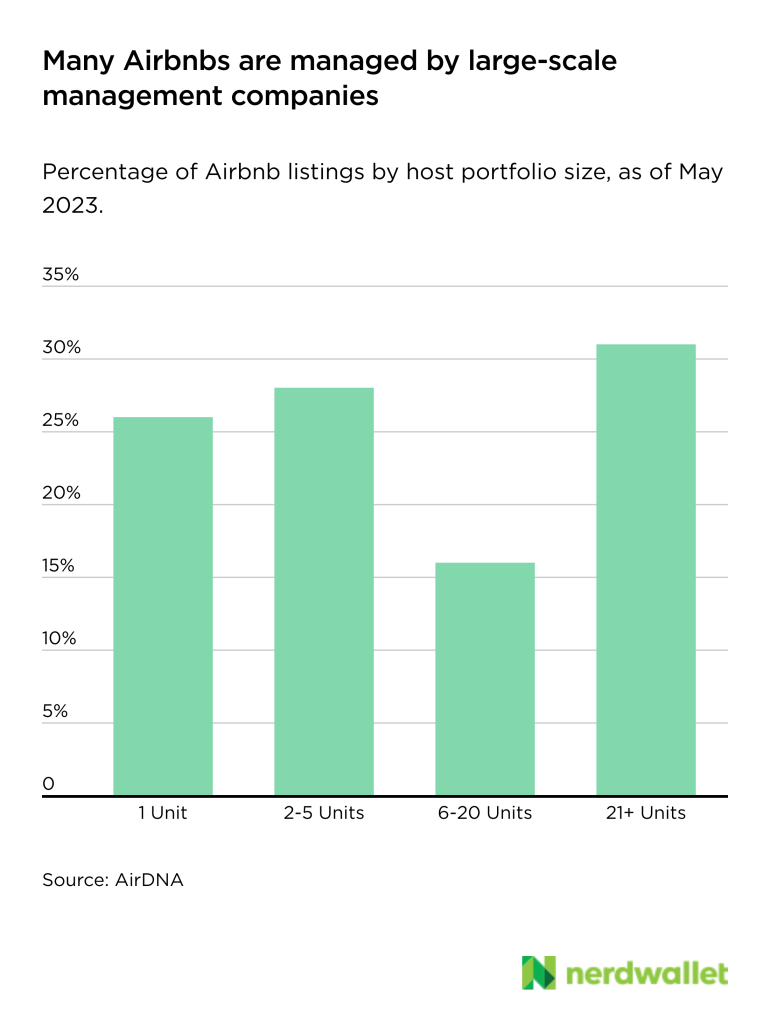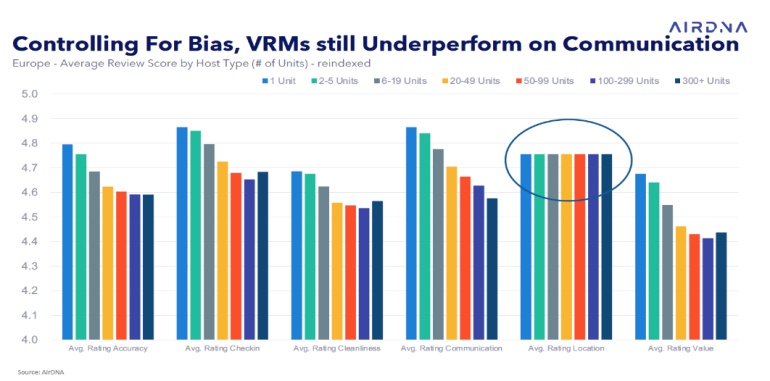By Sam Kemmis | NerdWallet
Airbnb has evolved significantly since its modest origins in 2007. What initially allowed homeowners to earn extra income by renting out spare rooms has transformed into a massive industry-disrupting behemoth.
The majority of travelers now prefer to rent entire residences rather than stay with hosts. According to a report from AirDNA, a short-term rental analytics company, private room bookings accounted for only 16% of U.S. short-term rental bookings in May 2023, marking an all-time low.
Additionally, many of the hosts who rent out their homes are not individual homeowners looking to earn some extra money. Instead, they are large management companies with extensive property portfolios, some of which consist of dozens or even hundreds of properties.
Data provided by AirDNA shows that over 30% of active listings in the U.S. are managed by hosts who have 21 or more properties, surpassing the 26% of listings managed by hosts with just one property.

In other words, nearly three out of every four Airbnb listings are now managed by hosts who have multiple properties in their portfolio. This raises the question: Is it beneficial for travelers to stay with these mega-hosts?
The impact on guest experience
Staying in a guest house has its own charm. If the hosts live nearby, they may offer local recommendations or provide personalized touches. However, many small-scale Airbnb hosts lack experience in hospitality and may not be available 24/7 to address customer service issues.
In theory, larger management companies could offer more consistent and professional guest experiences. However, this comes at the cost of personal interaction. A management company is unlikely to recommend the best bakery in town.
To analyze this trade-off using data, AirDNA compared guest reviews for properties in Europe managed by hosts with many properties versus those with fewer properties. They discovered a consistent trend: the larger the property portfolio, the lower the average rating.
At first glance, this might suggest that properties managed by big companies offer consistently worse experiences. However, Jamie Lane, chief economist at AirDNA, suspected that something else was at play.
“There’s typically lower review scores when you’re reviewing a company rather than a person,” Lane says. This implies that meeting and interacting with an individual host leads guests to leave higher scores.
To account for this, Lane’s team controlled for the ratings of the “location” aspect of the overall guest review, as this should not depend on the host’s portfolio size.
They found the same trend of lower scores across several ratings for larger portfolios, but they also uncovered some interesting details. Larger hosts scored only slightly lower than single-property hosts in terms of cleanliness ratings. Furthermore, hosts with over 300 properties scored slightly higher than those with 100-299 units.

The more units a host owns, the lower the average communication rating. This aligns with the lack of personal interaction from larger-scale hosts.
“I will typically leave [a single-property host] a higher review than if I rented with Vacasa and was working with their customer service person in the Philippines,” says Lane.
Do hosts with larger portfolios receive lower scores because their service is actually worse? Or because guests are more lenient towards smaller-scale hosts? The answer appears to be both.
What should travelers do?
The choice between a small-scale or large-scale Airbnb host largely depends on personal preferences. If you prefer a more hotel-like experience, you may feel more comfortable with a professional management company. However, if you value a personalized experience, it may be worth considering hosts with only one or two properties.
Unfortunately, Airbnb does not make it easy to search for properties based on the size of the manager’s portfolio or to see how many properties a host manages. Therefore, finding a property and host that align with your preferences requires clicking on individual properties and checking the hosts’ profiles.
Additionally, keep in mind that many properties are managed by medium-sized hosts who are real people with extensive experience. This may be the ideal option for travelers seeking high-quality service without sacrificing personal attention.
“There’s a broad trend of professionalization, but that doesn’t always mean [a property is] being run by larger companies,” says Lane. “There are lots of medium-sized organizations that are using tools to make their operations much more professional.”
Lastly, it’s important not to confuse “Superhosts” with hosts who have several properties. “Superhosts” are hosts with consistently high reviews and can own a single property or several hundred. They are typically among the most reliable hosts on the Airbnb platform.
More From NerdWallet
Sam Kemmis writes for NerdWallet. Email: skemmis@nerdwallet.com. Twitter: @samsambutdif.

